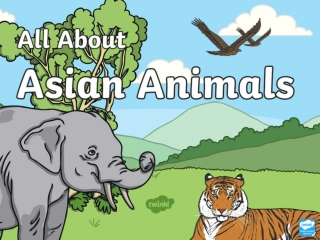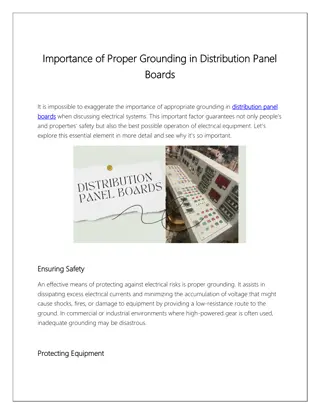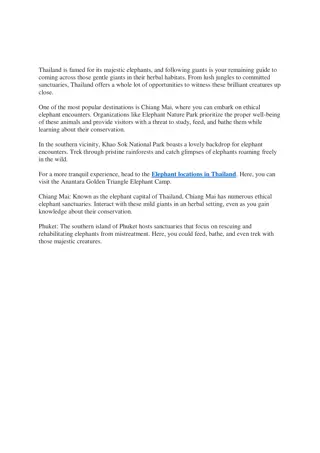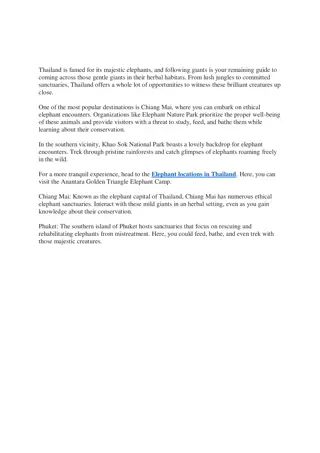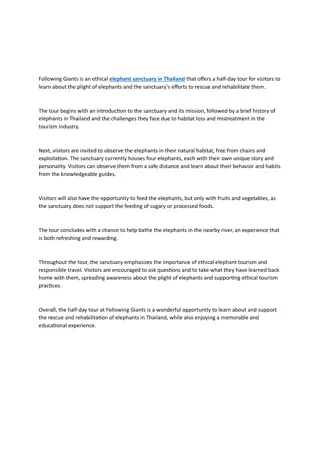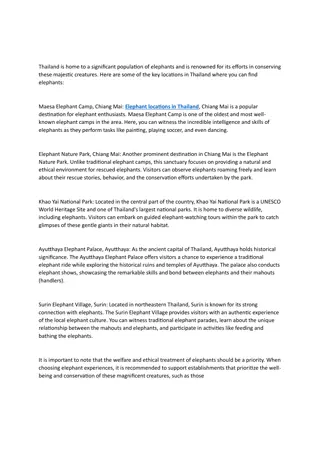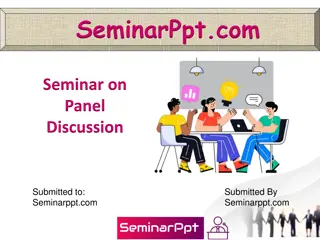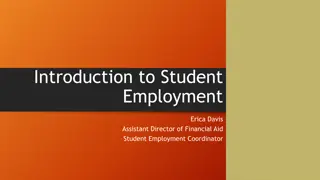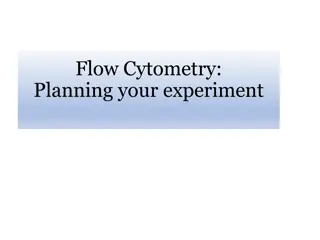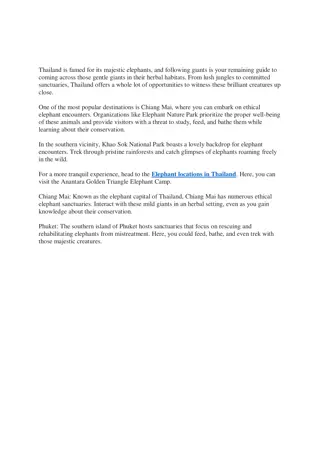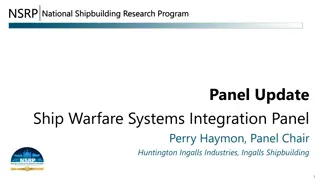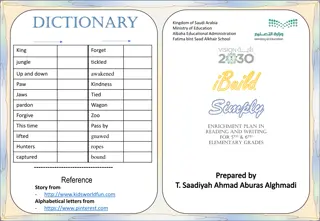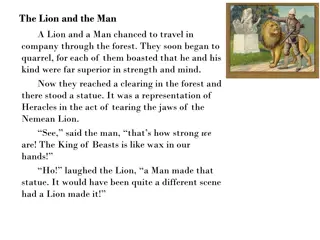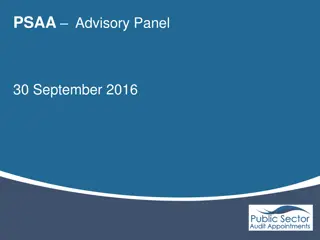High-Level Panel of Experts Review on Elephant, Lion, Leopard, and Rhinoceros Management
South Africa's High-Level Panel of Experts is tasked with reviewing policies, legislation, and practices related to the management, breeding, hunting, trade, and handling of iconic species like elephants, lions, leopards, and rhinoceros. Despite the country's conservation reputation, concerns around animal welfare persist, leading to the establishment of the Advisory Committee by Minister Barbara Creecy. The Panel's mandate includes evaluating interventions for species protection and community empowerment.
Download Presentation

Please find below an Image/Link to download the presentation.
The content on the website is provided AS IS for your information and personal use only. It may not be sold, licensed, or shared on other websites without obtaining consent from the author. Download presentation by click this link. If you encounter any issues during the download, it is possible that the publisher has removed the file from their server.
E N D
Presentation Transcript
The High The High- -Level Panel Level Panel A briefing on work of the High-level Panel of Experts for the Review of Policies, Legislation and Practices on Matters of Elephant, Lion, Leopard and Rhinoceros Management, Breeding, Hunting, Trade and Handling Presentation to the virtual meeting of the Portfolio Committee on Environment, Forestry And Fisheries, Tuesday, 3 November 2020 THE HIGH-LEVEL PANEL OF EXPERTS FOR THE REVIEW OF POLICIES, LEGISLATION AND PRACTICES ON MATTERS OF ELEPHANT, LION, LEOPARD AND RHINOCEROS MANAGEMENT, BREEDING, HUNTING, TRADE AND HANDLING th 1
Purpose The purpose of this presentation is to provide the requested briefing on the work of the Minister s High-level Panel of Experts for the Review of Policies, Legislation and Practices on Matters of Elephant, Lion, Leopard and Rhinoceros Management, Breeding, Hunting, Trade and Handling. 2
Briefing Overview Background; Mandate; The High-Level Panel s Scope of Work / Terms of Reference The Panel s current work; and planned activities The finalisation of the Panel s work. 3
Background Despite South Africa s excellent reputation as a global leader in conservation, especially in respect of iconic species like elephant, lion, leopard and rhinoceros, there is still a significant level of public concern around the policies, legislation and practices associated with these species, especially in terms of animal welfare and wellbeing. On 10 October 2019, the Minister of Environment, Forestry and Fisheries, Minister Barbara Creecy, established an Advisory Committee (the High- Level Panel or HLP) to look into these concerns, among others, through a Notice in the Gazette. The High Level Panel was appointed in terms of S.3A of the National Environmental Management Act, 1998 (Act 107 of 1998, NEMA). 4
Mandate The mandate of the High-Level Panel is the Review of Policies, Legislation and Practices on Matters Related to the Management, Breeding, Hunting, Trade and Handling of Elephant, Lion, Leopard and Rhinoceros 5
The High-Level Panels Scope of Work / Terms of Reference SPECIES 3 ELEPHANTS BLACK & WHITE RHINOCEROS SPECIES 5 LIONS SPECIES 1+2 SPECIES 4 LEOPARDS Key Species-related Issues: 5 Key Interventions for Rhino Enforcement Community Empowerment Demand Management Management of Rhino Populations Responsive Legislation Evaluate Outcomes of COI (Committee of Inquiry) & make recommendations Assess and Provide Policy positions and Operational guidelines Keeping of Rhinoceros in captivity Hunting of Rhino Population Management Trade in Rhino and Rhino horn Management of Stockpiles Impact and Benefits Handling & Wellbeing Key Species-related Issues: Key Species-related Issues: Key Species-related Issues: Assess and Provide Policy positions and Operational guidelines Keeping of elephants in captivity Hunting of Elephants Population Management Trade in elephant ivory Ivory Stockpiling Management of stockpiles Impact and benefits Handling & Well-being Assess and Provide Policy positions and Operational guidelines Hunting of Leopards Trade in Leopard skins Demand Management Impact and benefits Assess and Provide Policy positions and Operational guidelines Breeding of lions in captivity Hunting of captive bred lions Trade in lion bones and Leopard skins Stockpiling Management of stockpiles Impact and benefits Handling and Well-being Colloquium outcomes Review: Existing Policies, Legislation, Practices Focus Areas: Handling & Management, Breeding, Hunting, Trade 6
Terms of Reference identified Key Actors Government/Regulators/ Conservation Agencies (National & Provincial) International, Regional, Sub- regional Communities adjacent to Big 5 Protected Areas Industry, Game Ranchers, Hunting Associations NGOs Animal Welfare & Rights Groups Media 7
The work of the High-Level Panel to date Initiation The High-Level Panel started its work by way of a two-day Induction Workshop and Inaugural Meeting held on 28 and 29 November 2019 Thematic sub-committees In order to ensure a common understanding of the High-Level Panel s thematic areas and cross-cutting issues, High-Level Panel members divided themselves into sub-committees looking at Constitutional framework Legislation and mandates Land-use and the South African wildlife model Transformation in the sector Education and capacity building International position Animal welfare 8
The work of the High-Level Panel to date (Cont.) Public sector consultations from November 2019 to June 2020, the High-Level Panel consulted the following organisations in pre-lockdown workshops and meetings, and virtual meetings thereafter Department of Agriculture, Land Reform and Rural Development (DALRRD) Department of Tourism Department: Forestry, Fisheries and the Environment (DFFE) Directorate for Priority Crime Investigation (the Hawks ) National Prosecuting Authority (NPA) Provincial Departments and Conservation authorities involved with the 5 species South African National Biodiversity Institute (SANBI) South African National Parks (SANParks) State Attorney Services The Scientific Authority of South Africa The South African Revenue Service (SARS) 9
The work of the High-Level Panel to date (Cont.) The initiation of public stakeholder engagements on 27 March 2020, through notices in the Gazette and newspapers (the Star (2 April) and City Press (5 April)), the Panel initiated the broader public engagement process by inviting the public to submit written submissions, scientific information, socio-economic information or any other relevant information. Over 70 individual submissions were made - Rance Rural Development (Pty) Ltd SA Hunters and Game Conservation Association SA Black Hunters and Sports Shooting Association The South African Institute for Advanced Constitutional, Public, Human Rights and International Law Sandra Linde Taxidermy Silent Valley Game Breeders South African Predator Breeders Association Thaba Tholo The Fremar Lodge and Zoo Facility The True Green Alliance TRAFFIC Trollope Brothers Ukutula Lodge and Game Reserve University of Johannesburg University of North West University of the Free State Voice4Lions We Are All Mammals Wildlife & Environment Society of South Africa and National Association of Conservancies/Stewardship South Africa Wildlife ACT Fund Trust Wildlife Ranching SA World Wildlife Fund - Namibia World Wildlife Fund - South Africa Jensen Safari John Jay College of Criminal Justice Kube Yini Private Game Reserve Lord Ashcroft Makuya Traditional Council Manya Gittel Ms Carla van der Vyver National Wool Growers' Association - Predator Management Forum Padua University, Italy: School of Veterinary Medicine Panthera Professional Hunters Association of South Africa Piet Warren Pongola Nature Reserve Private Rhino Owners Association Adv Ramola Naidoo (Dr) African Wildlife Services/Safaris Anonymous/Safari Beauty Without Cruelty SA Blaauwkrantz Farm, EC Black Rock Rhino Conservation Blood Lions Born Free Foundation Brian Boswell Charan Saunders The Confederation of Hunting Associations in South Africa Christina Hiller International Council for Game and Wildlife Conservation Claudiushoop Wildsplaas COX Attorney Custodians of Professional Hunting and Conservation Daryn Hiltunen Dave Balfour Dr SCJ Joubert Elephant Specialist Advisory Group of South Africa EMS Foundation Endangered Wildlife Trust Environmental Investigation Agency Game Ranging Collective Global White Lion Protection Trust Graeme Siebert Humane Society Ian Rushworth International Wildlife Bond International Union for the Conservation of Nature Javelin Capital 10
PUBLIC SUBMISSIONS RECEIVED BY CLOSING DATE OF 15 JUNE 2020 DETAILED SUB-CATEGORIES 2% Research Institute (local) University (international) 3% 2% 16% University (local) 8% Communities wishing to benefit from wildlife Hunting farm 5% Game Breeder 8% Nature Reserve 10% 2% Lawyer Consultant 5% Zoo 3% Other Eco-tourism 3% Game farmers (non-intensive) 8% Hunt outfitters 2% Game Breeders (intensive) 5% 7% 2% Hunting Association 3% 2% Livestock farmers 2% Other 2% Animal Welfare 2% Environment (broad-based) Animal Rights Conservation 11
The work of the High-Level Panel to date (Cont.) Historical review the Panel has familiarized itself with the historical background leading up to, and informing, its work in order to ensure a more solid understanding of the status quo The Constitution, 1996 The 1997 Draft Biodiversity and Sustainable Use Policy The 1998 Environmental Management Policy The National Environmental Management Act (Act 107 of 1998) The National Environmental Management: Protected Areas Act (Act 57 of 2003) The National Environmental Management: Biodiversity Act, 2004 (Act No. 10 of 2004) The 2005 Panel of Experts on Professional and Recreational Hunting The 2006 Elephant Science Round Tables The 2012 Rhino Issues Management (RIM) process The 2014 Committee of Inquiry into the trade in rhino horn The 2016 Rhino Lab The 2018 Report on Intensive and Selective Game Breeding The 2018 Parliamentary colloquium on captive lion breeding for hunting and lion bone trade 12
The Panels current work Public consultation following the written submission from the general public, the Panel is now in the process of having live engagements with stakeholders within the COVID-19 constraints. The following initial consultations have been concluded Consultation 1. Wildlife Industry 29 September 2020; Consultation 2. Conservation NGOs and Individuals 2 October 2020; Consultation 3. Welfare and Advocacy Groups 6 October 2020; Consultation 4. Eco-tourism Groups 7 October 2020; Consultation 5. Tourism Business Associations 13 October 2020 Consultation 6. National House of Traditional Leaders 21 October 2020 Consultation 7. People and Parks National Committee 29 October 2020 Consultation 8. Associations of Traditional Healers 29 October 2020 13
The Panels current work Forthcoming stakeholder engagements include Community structures in KZN associated with Hluhluwe/Mfolozi Reserve, Tembe Elephant Park, iSimangaliso World Heritage Site (Ezemvelo KZN and iSimangaliso to facilitate though existing park forums) Community structures on the Western Boundary of Kruger Park (Limpopo) (Existing Forums convened by SANParks, Trans-frontier Conservation Areas (TFCA) and the Limpopo Department of Economic Development, Environment and Tourism (LEDET) Community structures on the Western Boundary of Kruger Park (Mpumalanga) (Forums convened by SANParks, TFCA and the Mpumalanga Tourism and Parks Agency) Community structures around Addo Elephant Park in Eastern Cape. (Forum Convened by SANParks.) Community structures in North West associated with Pilanesberg, Madikwe and Borakalalo Reserves (Existing Forums) 14
The finalisation of the Panels work The Panel will complete its consultation processes by mid-November The Panel will have a set of meetings to finalize a set of recommendations in the third week of November The report of the Panel with recommendations will be tabled to the Minister of Forestry, Fisheries and the Environment by 30 November 2020 15
Thank You for your kind attention 16


